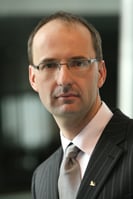 Our February edition of Actuaries Around the World takes us to Hungary. Gábor Borza is an actuarial consultant working with Tools4F and is a board member of the Hungarian Actuarial Society, which he chaired from 2013 until 2017.
Our February edition of Actuaries Around the World takes us to Hungary. Gábor Borza is an actuarial consultant working with Tools4F and is a board member of the Hungarian Actuarial Society, which he chaired from 2013 until 2017.
Borza spent the first 22 years of his professional career at ING / Nationale-Nederlandem, a retail financial provider. His expertise lies in life insurance and pensions and he teaches pension insurance to post-graduate actuaries. Borza is a member of the Pension Committee of the Actuarial Association of Europe. Prior to this, he was active in various industry associations and committees in Hungary and at the European level. Most notably, he was a member of the working group for the European Insurance and Occupational Pensions Authority (EIOPA) Occupational Pensions Stakeholder Group (OPSG).
ACTEX Learning (AL): How many practicing actuaries do you have?
Gábor Borza (GB): We have 217 members of our association. Some of them work outside the strictly actuarial profession, in risk management, finance or banking. There are also practicing actuaries who are not association members.
(AL): What is the word for actuary in your local language?
(GB): Aktuárius
(AL): When was actuarial science first introduced?
(GB): Over 100 years ago. The first Hungarian actuary published articles and participated in international events before World War I.
(AL): What is your favorite part about being an actuary?
(GB): Most actuaries have a similar sense of humor.
(AL): Can you share an interesting anecdote or two from your career?
(GB): When the company I worked for in the mid ‘90s developed a dread disease product (with an acceleration benefit), one of the actuaries created a “commercial slogan” (based on the calculation formulas): You are still alive, but we consider you already dead. This was hung on the wall during the whole process and they tried to explain to visitors that this would be a real slogan.
(AL): Do you have any advice for young people in your country interested in pursuing this career?
(GB): This career offers great opportunities -- you can either develop yourself as a high value specialist or later on, you can move into management.
(AL): What are some of the highlights of the history of the actuarial profession in your country?
(GB): 1991: Foundation of the Hungarian Actuarial Society
1995: Beginning of university actuarial education
1996: Hungary joined the International Actuarial Association
2004: Joined the Actuarial Association of Europe as a full member
(AL): What are some of the main challenges and projects for your association over the next 5-10 years?
(GB): Implementation of the International Standards of Actuarial Practice (IASPs) and European Standards of Actuarial Practice (ESAPs) into the everyday life of actuaries.
(AL): What developments on the horizon could affect future opportunities in your country?
(GB): Changes in life annuities that are hardly sold or bought on the market. In addition, the implementation of the pan-European personal pension product (PEPP) and in general true pension products. PEPP is a new initiative of the European Commission to promote individual pension savings by setting requirements for a special pension product allowing savers/investors to use the same long-term product while moving from one EU member state to another without losing the tax benefits.
(AL): Who are the main employers of actuaries?
(GB): Insurance companies, auditors, consulting companies, regulators, pension funds, and government (in order of significance).
(AL): What qualifications do you find most important for upcoming actuaries?
(GB): Technical skills combined with communication abilities and openness to new developments, such as big data.
(AL): Do schools in your country have actuarial majors, minors, concentrations or do students study on their own or overseas?
(GB): We have one university program, a joint program of two major universities (Corvinus and ELTE), providing actuarial master’s degree courses in Insurance and Financial Mathematics and Actuarial Specialization.
(AL): What is the credentialing procedure like for an actuary in your country?
(GB): One can apply for membership based on one’s professional work, support by two members and a presentation. Qualifying membership can also be obtained by university education and can be maintained by collecting CPD points.
(AL): Are there any noteworthy non-traditional actuarial positions?
(GB): Internal auditor, IT, CEO
(AL): What is your favorite Excel function and why?
(GB): Personally, SUMPRODUCT and matrix multiplication
(AL): Do you have any non-actuarial hobbies?
(GB): Travelling (but I guess this is rather actuarial as the actuarial conferences are all over the world and actuaries love travelling).
(AL): What could people from outside of your country do to help the profession grow?
(GB): Share experiences of similar-sized actuarial organizations with no paid staff and no office.
(AL): Thank you Gábor Borza!

